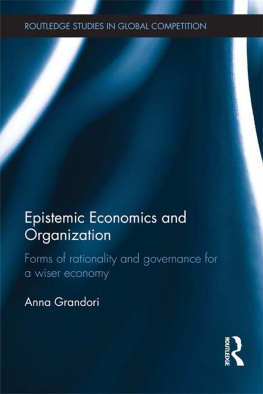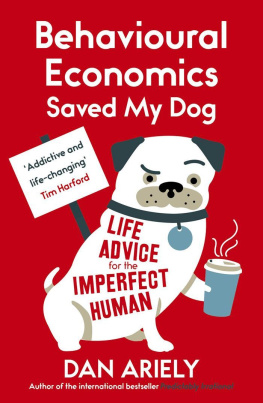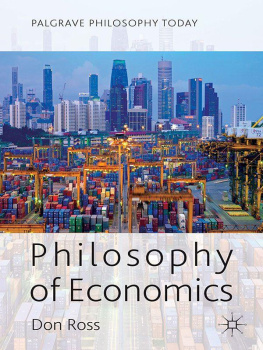David Orrell - Behavioural Economics
Here you can read online David Orrell - Behavioural Economics full text of the book (entire story) in english for free. Download pdf and epub, get meaning, cover and reviews about this ebook. year: 2020, publisher: Icon Books Ltd, genre: Politics. Description of the work, (preface) as well as reviews are available. Best literature library LitArk.com created for fans of good reading and offers a wide selection of genres:
Romance novel
Science fiction
Adventure
Detective
Science
History
Home and family
Prose
Art
Politics
Computer
Non-fiction
Religion
Business
Children
Humor
Choose a favorite category and find really read worthwhile books. Enjoy immersion in the world of imagination, feel the emotions of the characters or learn something new for yourself, make an fascinating discovery.
- Book:Behavioural Economics
- Author:
- Publisher:Icon Books Ltd
- Genre:
- Year:2020
- Rating:4 / 5
- Favourites:Add to favourites
- Your mark:
- 80
- 1
- 2
- 3
- 4
- 5
Behavioural Economics: summary, description and annotation
We offer to read an annotation, description, summary or preface (depends on what the author of the book "Behavioural Economics" wrote himself). If you haven't found the necessary information about the book — write in the comments, we will try to find it.
Behavioural Economics — read online for free the complete book (whole text) full work
Below is the text of the book, divided by pages. System saving the place of the last page read, allows you to conveniently read the book "Behavioural Economics" online for free, without having to search again every time where you left off. Put a bookmark, and you can go to the page where you finished reading at any time.
Font size:
Interval:
Bookmark:
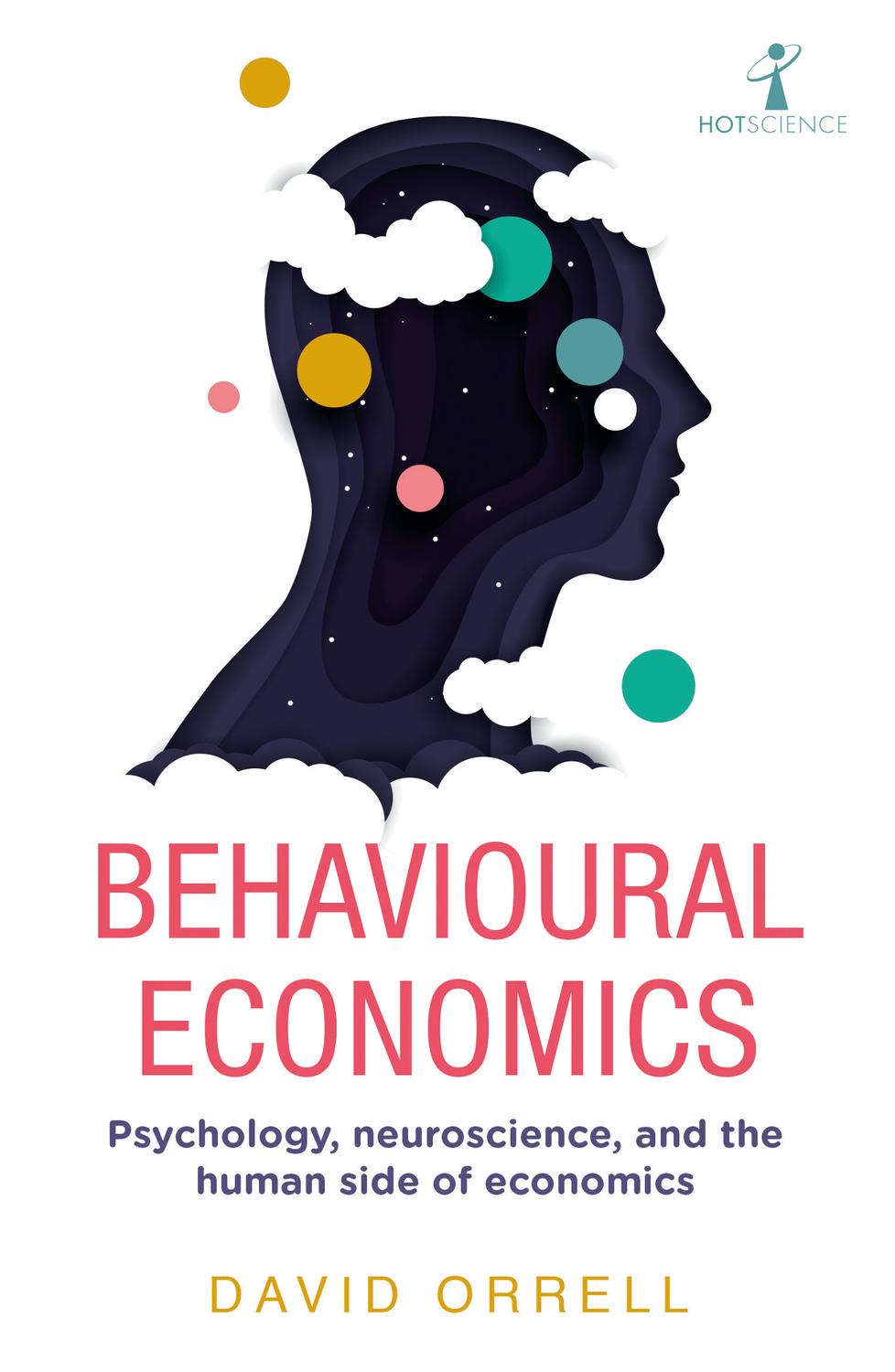
i
Hot Science is a series exploring the cutting edge of science and technology. With topics from big data to rewilding, dark matter to gene editing, these are books for popular science readers who like to go that little bit deeper
Destination Mars:
The Story of Our Quest to Conquer the Red Planet
Big Data:
How the Information Revolution is Transforming Our Lives
Gravitational Waves:
How Einsteins Spacetime Ripples Reveal the Secrets of the Universe
The Graphene Revolution:
The Weird Science of the Ultrathin
CERN and the Higgs Boson:
The Global Quest for the Building Blocks of Reality
Cosmic Impact:
Understanding the Threat to Earth from Asteroids and Comets
Artificial Intelligence:
Modern Magic or Dangerous Future? ii
Astrobiology:
The Search for Life Elsewhere in the Universe
Dark Matter & Dark Energy:
The Hidden 95% of the Universe
Outbreaks & Epidemics:
Battling Infection From Measles to Coronavirus
Rewilding:
The Radical New Science of Ecological Recovery
Hacking the Code of Life:
How Gene Editing Will Rewrite Our Futures
Origins of the Universe:
The Cosmic Microwave Background and the Search for Quantum Gravity
Behavioural Economics:
Psychology, Neuroscience, and the Human Side of Economics
Quantum Computing:
The Transformative Technology of the Qubit Revolution
Hot Science series editor: Brian Clegg
This volume forms part of the Hot Science series of books, and if there is one area of economics which would seem to qualify for that descriptor it is behavioural economics. Both because it is hot according to the American Economic Association, since 1995 the number of academic meetings on the topic has expanded by about a factor of ten and because it is based on empirical science. The marriage of psychology, neuroscience, and economics, behavioural economics is an attempt to put the study of economic decision-making onto a firm scientific basis.
Economists had long assumed, if only to simplify their models, that people make decisions rationally in order to optimise their utility (i.e. happiness or pleasure). Here rational doesnt mean sensible or reasonable, it just means acting in a way that is internally consistent. Psychologists, after many decades of the close study of actual human behaviour, had come to a rather different conclusion.
For example, far from being perfectly clear-sighted and rational, we are subject to numerous cognitive biases. In fact, identifying such biases has become something of a growth industry Wikipedia currently lists about 200 of them, ranging from general ones like the default effect (given a number of options we tend to select the default one) to more specific ones such as the IKEA effect, which refers to The tendency for people to place a disproportionately high value on objects that they partially assembled themselves, such as furniture from IKEA, regardless of the quality of the end result (a similar effect explains why cake mixes ask you to add an egg). Often these are combined, as when IKEA becomes the default option for home furnishing.
While some of these biases arise from the way we perceive the world and structure our thoughts as individuals, many are caused by social factors. Mainstream economics has traditionally treated people as the social equivalent of individual atoms, but behavioural economists argue that everything from the way we shop at the neighbourhood mall to the workings of the global financial system is shaped by the way we interact as groups. An example is the behaviour seen in stock markets, where investors frequently stampede in and out of the market in near-perfect synchrony like a startled herd of cattle.
One reason for these biases is that, far from being the computer-like Homo economicus of traditional economics, where every decision is based on Spock-like logic, we make most decisions based on heuristics rules-of-thumb, like going for that default option, that provide a shortcut and allow us to protect our brains from too much demanding thought. It seems we are as stingy with our mental resources as we are with the physical kind. And when faced with complex questions with payoffs that are hard to compare, we often reinterpret the question by framing it in a particular way to make the decision easier or allowing someone else, like a marketer or politician, to frame it for us.
Behavioural economics also raises other questions about the core ideas of economics, such as the thorny topic of utility. In traditional economics, people were assumed to have fixed preferences. The purpose of economic exchange was to optimise utility, which was a measure of how these preferences were met. Psychologists have long known, however, that our preferences are not set in stone, but change with time and with context. Utility is therefore not a stable or well-defined quantity, which as we will see has implications for how we model economic transactions. Behavioural effects also come into play in other areas such as finance or macroeconomics (the study of the economy as a whole), which have come under increasing scrutiny since the financial crisis of 20078.
Although its roots go back much further, behavioural economics as we know it today began with the work of small teams of psychologists in the 1970s. They were interested not in building a grand general theory of economics but in studying how people actually make decisions, through experiments where they enlisted subjects to play games or make choices. In the last few decades the field has become increasingly popular publicised in books such as Freakonomics (2005) by economist Steven Levitt and journalist Stephen J. Dubner, Nudge (2008) by economist Richard H. Thaler and law professor Cass R. Sunstein, and Thinking, Fast and Slow (2011) by psychologist Daniel Kahneman and has become a regular offering in university curricula. Its founders (including Thaler and Kahneman) have been garlanded with the Nobel Memorial Prize in Economic Sciences, which is the economics version of the Nobel Prize. However, as well see, the field also has its critics such as forecasting expert Nassim Taleb who say it goes too far in attempting to model human psychology (he has described it as bullshit science), and others who say it doesnt go far enough.
This book will take you on a guided tour of some of the murkier aspects of economic behaviour, and show how behavioural economics is putting the study of human nature back into economics, including shaping our response to some of our most pressing issues such as climate change and pandemics. The rest of the book can be divided roughly into three parts. Chapters 1 and 2 show how behavioural economics is affecting us today, and goes back to revisit how it first emerged as a contender to mainstream approaches. Chapters 3 to 6 focus on how people make decisions as individuals. We explore the various cognitive effects that sometimes confuse us, and the heuristics that get us through the day. Finally, Chapters 7 and 8 broaden the view to consider social behaviours such as herding and altruism, and show how these effects scale up to affect areas such as the stock market and the macroeconomy.
Along the way, we will look at some of the ways behavioural economics is used and abused by companies and governments, assess the strengths and weaknesses of the field, consider its effectiveness as a policy tool, and ask whether it represents a revolution in economics, or is best seen as an adjustment to existing practice. We begin in the next chapter by considering an archetypal illustration of the power, the challenges, and the limitations of behavioural economics.
Font size:
Interval:
Bookmark:
Similar books «Behavioural Economics»
Look at similar books to Behavioural Economics. We have selected literature similar in name and meaning in the hope of providing readers with more options to find new, interesting, not yet read works.
Discussion, reviews of the book Behavioural Economics and just readers' own opinions. Leave your comments, write what you think about the work, its meaning or the main characters. Specify what exactly you liked and what you didn't like, and why you think so.

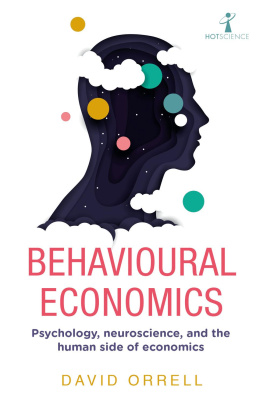
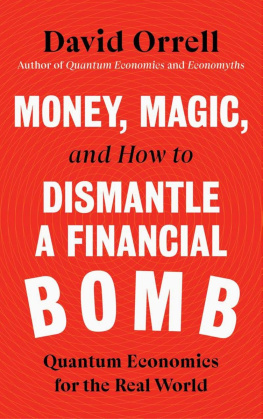
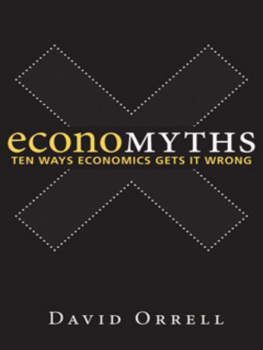
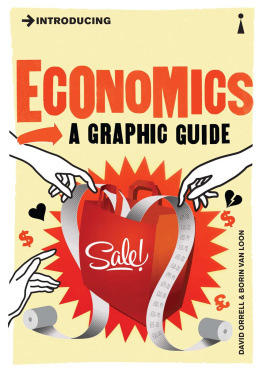


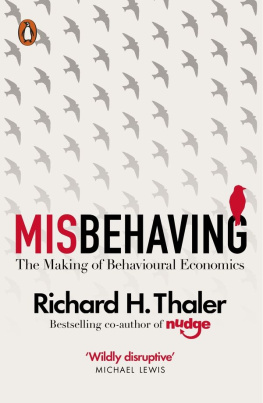
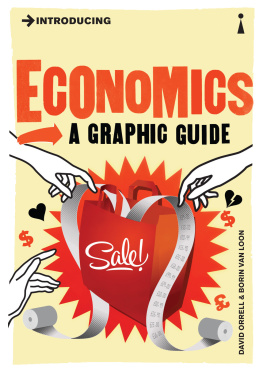
![David Orrell [David Orrell] - Quantum Economics](/uploads/posts/book/114631/thumbs/david-orrell-david-orrell-quantum-economics.jpg)
